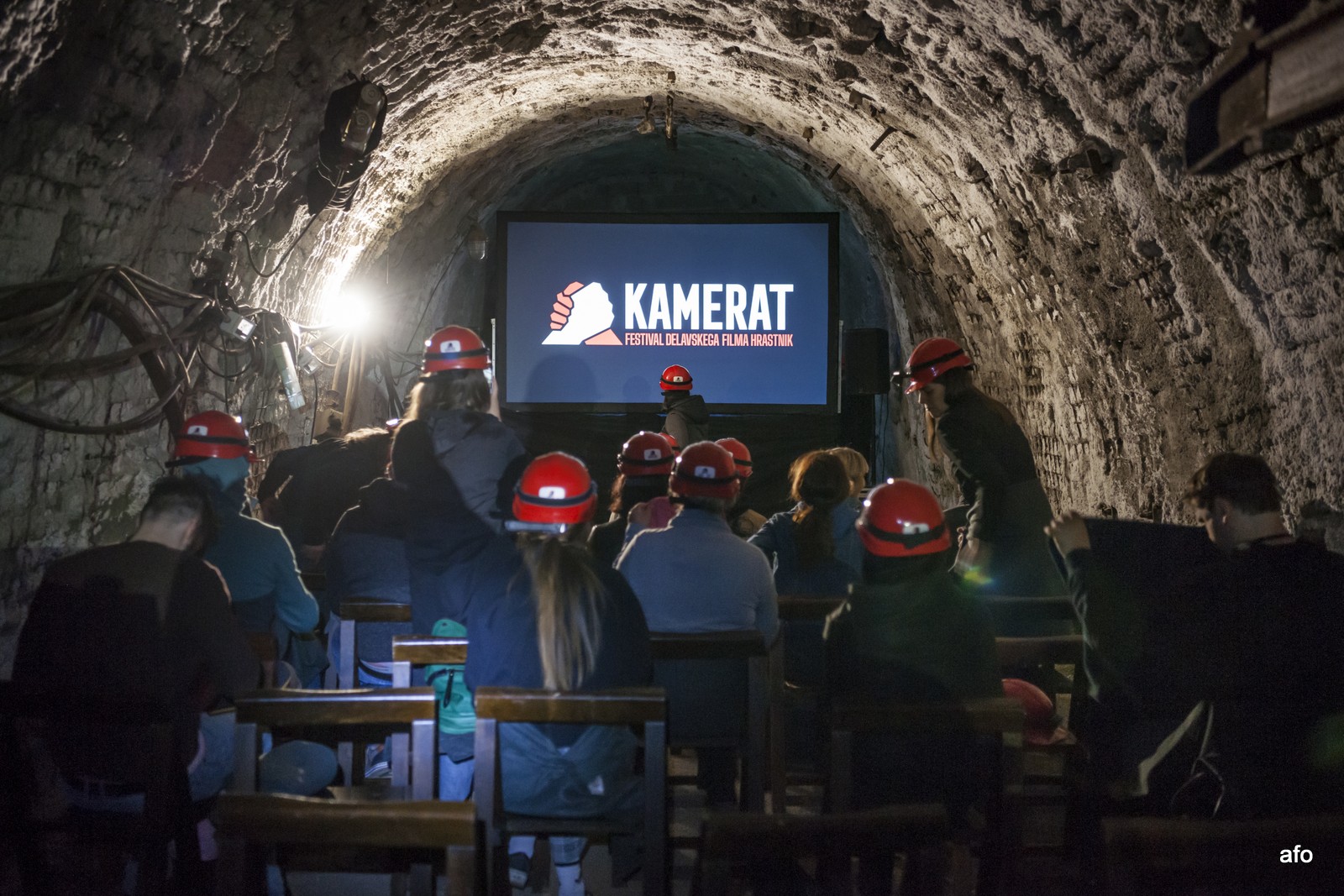Festivali
KAMERAT FILM FESTIVAL, HRASTNIK, SLOVENIA:
1-3 July 2021
A film tribute to work and solidarity

KAMERAT in Hrastnik is the first and only workers' film festival in Slovenia and one of the few of its kind in the world. Friends ofCulture, Film and Decent Work were inspired by the strike of workers in all industries in Hrastnik, who in 1934 demanded and won better working conditions. The 1st festival edition was held on this 3rd July anniversary, as the local community celebrates solidarity, camaraderie and the importance of standing together for common goals.
Its setting in the local environment of historical milestones of workers' movements with traditional mining and glass workers' culture gives it the opportunity to screen films at unique locations - in the mine pit, compressor station and former workers' bath - vashavi.
The programme includes 14 films of different genres and forms, but all focused on workers’ rights and a fight for dignified labour, divided into programme sections - Retrospective, Documentary, Feature film and Focus. In collaboration with the British Council, a special tribute is paid in Focus to the work of the protagonist of social realism and social criticism in film, the renowned director Ken Loach.
The aim of the festival is to explore the position of labour at the intersections between history and the future, a question of changing the concept of work and labour rights in various socio-economic-technological contexts. The new festival, further, seeks to foreground the message that culture and labour are not separate areas, but that synergy is taking place between them, as the creators of culture are also workers. The central idea of the festival, however, is to combine labour and culture in a tribute to the Zasavje rebellion and to examine the position of work and culture against the challenges of today.
The festival main theme is reinforced by an accompanying programme, such as round tables, talks with national and foreign artists, workshops and trainings. It connects with trade unions, movements, activists, artists and cultural workers, pursuing the long-term goal of visibility at the national level and beyond, which will not be difficult thanks to the unique festival “cinemas”, striking locations, and its amazing and enthusiastic team, dedicated to workers’ rights and socially engaging films, of which I am happy to be part as a film selector. I am convinced that this will be my favourite international film festival, foreseeing its huge impact on the national and international social reality, when Covid-19 epidemic measures will have been relieved.
The festival is organised by the Public Institute for Culture, Sports, Youth and Tourism Hrastnik - KRC Hrastnik and in cooperation with the Municipality of Hrastnik, the Movement for Decent Work and Social Society, and supported by many others.
"Hrastnik and Zasavje have a strong tradition of working culture, marked by the values of mutual assistance, camaraderie, even rebellion, and it is from it that our festival also emerges from," states Simon Tanšek, the award-winning director of photography and lecturer at AGRFT, who programmed the festival. "At the same time, we also want to present Zasavje as an environment that is no longer just a dirty industrial area, but there is still a lot going on – and a diverse industrial heritage can be a very important factor in the development of cultural tourism."
The organisers want, as the mayor of the Mayor Marko Funkl pointed out at the opening presentation, to make the festival "the binder and cultural fabric of the identity of our place, which has an ambition to become a green, culturally developed and inclusive working-class place that is worth visiting mainly because of the wonderful, working and stubborn people who have and still have their own existence through hard work in the mine, glass works, chemical plants and other industrial plants in Zasavje.'
The festival dates –between 1 and 3 July – were carefully chosen, as the Festival director/coordinator Nina Kavzar explains. "The kamerat – as knap used to say – means not only a colleague, but much more. It means camaraderie, it means solidarity, it means getting organised for common goals. On 3 July 1934, the Zasavski miners were organised and joined by all workers from other industries. Together, they won a five-day hunger strike on decent working conditions. Thus, 3rd July became a holiday of the municipality of Hrastnik."
The festival opening day screened two short films in the Hrastnik mine, Dusan Kastelica's Cell and Steklarski blues by Peter Braatz. Apart from the Focus on great Ken Loach’s two films: Me, Daniel Blake and Sorry, we missed you, screened were also: Early Works (by Želimir Žilnik), Ovacik (by Selenga Taşkent), The Work of Liberators (by Damjan Kozole), Where did the working class go? (by Maja Weiss), Thieves of Time (by Cosima Dannoritzer), Goldfish, African Fish (byThomas Grand and Moussa Diop), Die for Gold (by Richard Pakleppa and Catherine Meyburgh), Father (by Srdan Golubović), Andrés Carrasco: Disruptive Science (by Valeria Turci) and Pride (by Matthew Wachus).
At a round table entitled Combative trade unionism, experiences were shared by experienced Slovenian trade unionists. When strike time comes, the employer's pressure on labour is so strong that people are often intimidated and the resistance fails as a result, the participants have clearly pointed out. So when should the union intervene in the most extreme means of a union fight? And how do you make sure membership isn't just symbolic? Trade union integration is also an indispensable part of the struggle for workers' rights in Slovenia. However, such an engagement, which, in unsupported circumstances, must make organic progress to a more active fight for rights taken away and to protect the rights already acquired is not self-evident. There is an organised and committed structure behind the organisation of the trade union strike, which, in modern circumstances - but also throughout history - is constantly confronted with social ness and malicious stop-and-comings from the capital interest of employers.
http://kamerat.org/festival/
fotografije: https://kamerat.org/2021/07/07/foto-galerija/


